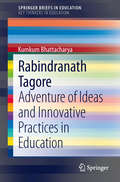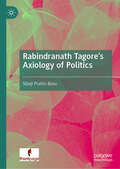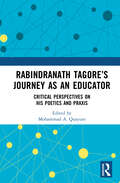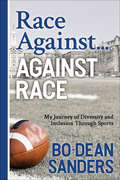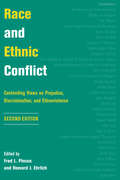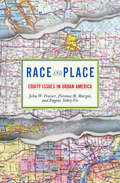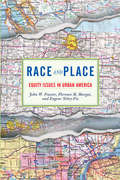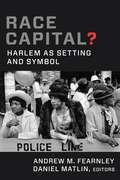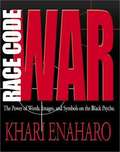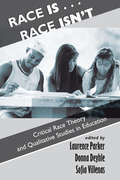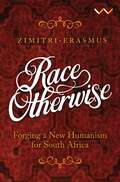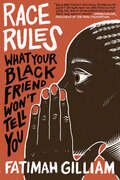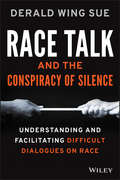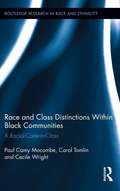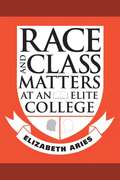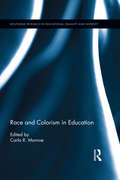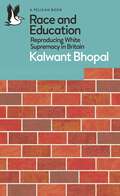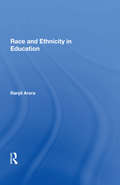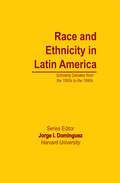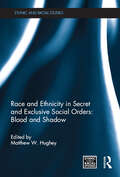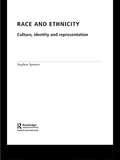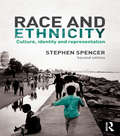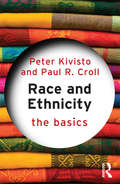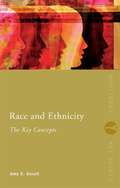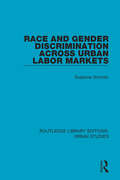- Table View
- List View
Rabindranath Tagore
by Kumkum BhattacharyaThis new addition to Springer's series on Key Thinkers in World Education tracks the intellectual and philosophical journey of a trail-blazing innovator whose ideas have fired the imaginations of progressive educationalists for almost a century. The volume's in-depth analysis of the educational philosophy of Bengali polymath Rabindranath Tagore offers an unrivalled focus on his highly influential views. Tagore--poet, internationalist, humanist, and the first non-European to win the Nobel Prize for literature--lived on the cusp of change between two momentous centuries in world civilization and foresaw the dissolution of colonialism and the globalization of culture. His ideas on education placed the creative individual at the centre of the quest for knowledge. Eschewing the artificial distinctions between elementary and higher learning, he advocated the importance of sowing the seed of humanism as early as possible, and fostering the individual's enjoyment of education as well as their courage to challenge conventions. In doing so, he anticipated the modern concern with critical thinking at the same time as he was encouraging independence of thought and action as a counter to colonial oppression and condescension. Concise yet thorough, this volume on one of the most original thinkers of the last century covers every aspect of Tagore's highly original educational philosophy.
Rabindranath Tagore's Axiology of Politics
by Sibaji Pratim BasuThis book revisits Rabindranath Tagore’s opinion and standpoints on constituent elements of politics from the stance of this marker––axiology, so that many well-known aspects of his thought may be seen in a different light. Among the Indian luminaries of the first half of the twentieth century, who were well-known both in the East and the West, Rabindranath Tagore (1861–1941) was arguably the most ‘gifted’ personality. Besides being the first non-European recipient of the Nobel Prize for Literature (1913) and the ‘ambassador’ of Indian culture to the West, he also wrote voluminous essays and letters on socio-political issues––engaged himself in various protests against the raj, as a pacifist in international arena and also as a polemical writer. Tagore is often described as the ‘conscience’ of the Indian nation. This book includes a long Tagore-Einstein conversation and a longish dialogue with H G Wells and his creative writings––poems, fictions, plays, and ‘personal’ letters––along with his direct political discourses to understand his Political Thought in a more comprehensive way.
Rabindranath Tagore’s Journey as an Educator: Critical Perspectives on His Poetics and Praxis
by Mohammad A. QuayumThis book looks at Rabindranath Tagore’s, experiments and journey as an educator and the influence of humanistic worldviews, nationalism and cosmopolitanism in his philosophy of education. It juxtaposes the educational systems and institutions set up by the British colonial administration with Tagore’s pedagogical vision and schools in Santiniketan, West Bengal—Brahmacharya Asram (1901), Visva-Bharati University (1921) and Sriniketan Institute of Village Reconstruction (1922). An educational pioneer and a poet-teacher, Tagore combined nature and culture, tradition and modernity, East and West, in formulating his educational methodology. The essays in this volume analyse the relevance of his theories and practice in encouraging greater cultural exchange and the dissolution of the walls between classrooms and communities. This book will be useful for scholars and researchers of education, Tagore studies, literature, cultural studies, sociology of education, South Asian studies and colonial and postcolonial studies.
Race Against … Against Race: My Journey of Diversity and Inclusion Through Sports
by Bo-Dean Sanders“Delves into the highs and lows of . . . a talented, young Black football athlete and first-generation college student, navigating identity and race.” —Dennis Kennedy, founder and chairman of National Diversity CouncilRace Against . . . Against Race is the story of one young man’s dream of playing college football and the social development that unfolded as he tried to fit in on a predominantly white campus. He slowly integrates into his new environment by staying positive, being himself and focusing on shared experiences with his teammates and classmates.Within this book, Bo-Dean paints a picture of a student athletes’ campus life in the ’80s and aims to examine the issues of race through his participation in college sports. Throughout his time as a student athlete, he discovers that he and his teammates learn from each other on and off the field by having the race conversation to develop and grow their relationships based on the foundation of sports, mutual respect, and acceptance.“Sanders tells a riveting story of pushing himself to reach the goal that he thought mattered most—becoming a collegiate and professional football player. It is a gripping tale of growing up under the weightiness of segregation and poverty in the South and leaving home to go north to start life on his terms.” —Allener M. Baker-Rogers, EdD, coauthor of They Carried Us“He provides a unique perspective on building relationships with teammates and classmates from different socio-economic backgrounds and races by reaching out, talking, and listening. In his first-ever book, Sanders explores how diversity and inclusion in sports and multiculturalism impacted his personal relationships in college.” —Delco Times
Race And Ethnic Conflict: Contending Views On Prejudice, Discrimination, And Ethnoviolence
by Fred L PincusIn the revised and updated second edition of this comprehensive book, the first anthology to integrate social-psychological literature on prejudice with sociological and historical investigations, contributors introduce readers to the key debates and principal writings on racial and ethnic conflict, representing conservative, liberal, and radical p
Race And Place
by Florence Margai John W. Frazier Eugene Tettey-FioRacism, racial equity, and the race-place connections related to racial inequalities in the U.S. are the major themes of this book. The long history of U.S. White racism toward Blacks, Hispanics, and Asians is deeply rooted in the political, socioeconomic, and intellectual frameworks of America, permitting racial inequities to become expressed as cultural landscapes-the places where many racial minorities exist. The contemporary geographic patterns of segregation and isolation are different from those of earlier U.S. history, but are equally damning and present extremely difficult challenges for social action in a nation that will change its racial/ethnic composition dramatically during the current generation.As America changes over the next quarter century, the visible and invisible race-place inequalities that help define U.S. urban geography will continue in housing, education, employment, travel requirements, shopping choices, environmental hazards, and other living conditions. Minority groups, ever increasing in numbers, will find inequalities unacceptable. How America deals with racial inequalities will likely have consequences for all its citizens.
Race And Place: Equity Issues In Urban America (Global Academic Publishing Ser.)
by John W. FrazierThis book addresses the issues in an empirical fashion after examining different sociological and geographic perspectives. It provides a basic understanding of the multi-faceted nature of racial inequalities in urban America, both in a broad context and in separate analyses of housing.
Race Capital?: Harlem as Setting and Symbol
by Editors Daniel Matlin Andrew M. FearnleyFor close to a century, Harlem has been the iconic black neighborhood widely seen as the heart of African American life and culture, both celebrated as the vanguard of black self-determination and lamented as the face of segregation. But with Harlem’s demographic, physical, and commercial landscapes rapidly changing, the neighborhood’s status as a setting and symbol of black political and cultural life looks uncertain. As debate swirls around Harlem’s present and future, Race Capital? revisits a century of the area’s history, culture, and imagery, exploring how and why it achieved its distinctiveness and significance and offering new accounts of Harlem’s evolving symbolic power.In this book, leading scholars consider crucial aspects of Harlem’s social, political, and intellectual history; its artistic, cultural, and economic life; and its representation across an array of media and genres. Together they reveal a community at once local and transnational, coalescing and conflicted; one that articulated new visions of a cosmopolitan black modernity while clashing over distinctions of ethnicity, gender, class, and sexuality. Topics explored include Harlem as a literary phenomenon; recent critiques of Harlem exceptionalism; gambling and black business history; the neighborhood’s transnational character; its importance in the black freedom struggle; black queer spaces; and public policy and neighborhood change in historical context. Spanning a century, from the emergence of the Harlem Renaissance to present-day controversies over gentrification, Race Capital? models new Harlem scholarship that interrogates exceptionalism while taking seriously the importance of place and locality, offering vistas onto new directions for African American and diasporic studies.
Race Code War
by Khari EnaharoThis book is designed to increase awareness of Black and White people as to the role of communication in the continuing practice of racism and racial alienation. It is also designed to expose the use of racially loaded and color-coded language.
Race Is...Race Isn't: Critical Race Theory And Qualitative Studies In Education
by Laurence ParkerThe field of critical race theory has gotten increasingly more attention as an emerging perspective on race, the law, and policy. Critical race theory examines the social construction of the law, administrative policy, electoral politics, and political discourse in the U.S. Race Is ? Race Isn't presents a group of qualitative research studies, literature reviews, and commentaries that collectively articulate critical race theory in secondary and post-secondary educational settings. The editors explore links and conflicts with other areas of difference, including language, ethnicity, gender, and sexual orientation, with the goal of opening a dialogue about how critical race theory can be incorporated into education research methodologies.
Race Otherwise: Forging a new humanism for South Africa
by Zimitri ErasmusThree tensions to consider in the making and unmaking of raceIn Race Otherwise: Forging a New Humanism for South Africa Zimitri Erasmus questions the notion that one can know 'race' with one's eyes, or through racial categories and or genetic ancestry tests. She moves between the intimate probing of racial identities as we experience them individually, and analysis of the global historical forces that have created these identities and woven them into our thinking about what it means to be 'human'. Starting from her own family's journeys through regions of the world and ascribed racial identities, she develops her argument about how it is possible to recognize the pervasiveness of race thinking without submitting to its power. Drawing on the theoretical work of Frantz Fanon, Sylvia Wynter and others, Erasmus argues for a new way of 'coming to know otherwise', of seeing the boundaries between racial identities as thresholds to be crossed, through politically charged acts of imagination and love.
Race Rules: What Your Black Friend Won't Tell You
by Fatimah Gilliam“Those looking to move beyond performative allyship will find this an excellent resource.” —Publishers Weekly“Well-informed, hard-hitting advice for antiracists.” —Kirkus ReviewsWhat if there were a set of rules to educate people against race-based social faux pas that damage relationships, perpetuate racist stereotypes, and harm people of color? This book provides just that in an effort to slow the malignant domino effect of race-based ignorance in American communities and workplaces to help address the vestiges of our nation's racist past.Race Rules is an innovative, practical manual for white people of the unwritten rules relating to race, explaining the unvarnished truth about racist and offensive white behaviors. It offers a unique lens from Fatimah Gilliam, a light-skinned Black woman, and is informed by the revealing things white people say when they don't realize she's Black.Presented as a series of race rules, this book has each chapter tackling a specific topic many people of color wish white people understood. Combining history and explanations with practical advice, it goes beyond the theoretical by focusing on what's implementable. Gilliam addresses issues such as:Racial blinders and misperceptions White privilegeRacial stereotypes Everyday choices and behaviors that cause racial harmIntroducing a straightforward universal three-step framework to unlearn racism and challenge misconceptions, this book offers readers a chance to change behaviors and shift mindsets to better navigate cross-racial interactions and relationships. Through its race etiquette guidelines, it teaches white people to become action-oriented racism disruptors instead of silent, complicit supporters of white supremacy.
Race Talk and the Conspiracy of Silence
by Derald Wing SueLearn to talk about race openly, honestly, and productively Most people avoid discussion of race-related topics because ofthe strong emotions and feelings of discomfort that inevitablyaccompany such conversations. Rather than endure the conflict ofracial realities, many people choose instead to avoid the topicaltogether, or remain silent when it is raised. Race Talk andthe Conspiracy of Silence: Understanding and Facilitating DifficultDialogues on Race puts an end to that dynamic by sharingstrategies for smoothing conversations about race in a productivemanner.A guide for facilitating and participating in difficultdialogues about race, author Derald Wing Sue - aninternationally recognized expert on multiculturalism, diversity,and microaggressions - explores the characteristics,dynamics, and meaning behind discussions about race as well as thehidden "ground rules" that inhibit honest and productive dialogue.Through emotional and visceral examples, this book explains whyconversations revolving around racial issues are so difficult, andprovides guidelines, techniques, and advice for navigating andleading honest and forthright discussions. Readers will develop astronger ability to build rapport with people unlike themselves,and discover how not talking about race impacts society as awhole.Overcome and make visible the fears associated with racetalkLearn practical ideas for talking openly about raceFacilitate and navigate discussion with expert strategyExamine the hidden rules that govern race talkUnderstand the benefits of successful conversationsDiscussions about race do not have to result in disastrousconsequences, and can in fact be highly beneficial to all partiesinvolved. It's important that people have the ability to converseopenly and honestly with their students, colleagues, children, andneighbors, and Race Talk provides the path for achievingthis goal.
Race and Class Distinctions Within Black Communities: A Racial-Caste-in-Class (Routledge Research in Race and Ethnicity #9)
by Paul Camy Mocombe Carol Tomlin Cecile WrightThis book offers both a philosophical and sociological model for understanding the constitution of identity in general, and black social identity in particular, without reverting to either a social or racial deterministic view of identity construction. Using a variant of structuration theory (phenomenological structuralism) this work, against contemporary postmodern and post-structural theories, seeks to offer a dialectical understanding of the constitution of black American and British life within the class division and social relations of production of the global capitalist world-system, while accounting for black social agency.
Race and Class Matters at an Elite College
by Elizabeth AriesInRace and Class Matters at an Elite College, Elizabeth Aries provides a rare glimpse into the challenges faced by black and white college students from widely different class backgrounds as they come to live together as freshmen. Based on an intensive study Aries conducted with 58 students at Amherst College during the 2005-2006 academic year, this book offers a uniquely personal look at the day-to-day thoughts and feelings of students as they experience racial and economic diversity firsthand, some for the first time. Through online questionnaires and face-to-face interviews, Aries followed four groups of students throughout their first year of college: affluent whites, affluent blacks, less financially advantaged whites from families with more limited education, and less financially advantaged blacks from the same background. Drawing heavily on the voices of these freshmen, Aries chronicles what they learned from racial and class diversity-and what colleges might do to help their students learn more.
Race and Colorism in Education (Routledge Research in Educational Equality and Diversity)
by Carla MonroeAs one of the first scholarly books to focus on colorism in education, this volume considers how connections between race and color may influence school-based experiences. Chapter authors question how variations in skin tone, as well as related features such as hair texture and eye color, complicate perspectives on race and they demonstrate how colorism is a form of discrimination that affects educational stakeholders, especially students, families, and professionals, across P-16 institutions. This volume provides an outline of colorism’s contemporary relevance within the United States and shares considerations for international dimensions that are linked to immigration, refugee populations, and Canada. By situating colorism in an educational context, this book offers suggestions for how educators may engage and confront this form of discrimination.
Race and Education: Reproducing White Supremacy in Britain (Pelican Books)
by Kalwant BhopalWhy is our education system unequal?How does race play a part?Is Britain still institutionally racist?Education remains the greatest indicator of life chances in Britain. What we study, where we study, and how long for shape all aspects of our lives. Our careers, our long-term health, our wealth and security are all moulded in the classroom.But who we are ultimately matters the most.In Race and Education, Professor Kalwant Bhopal shows how race still determines who gains the best education in Britain, and who falls by the wayside. Through case studies, original research and interviews with students, teachers and academics alike, she reveals how the construction of privilege starts at a young age: with Whiteness taking some students on a gilded path from cradle to career, while many still struggle to build the futures they deserve.This book highlights how classrooms and lecture halls are at the centre of perpetuating White privilege - and how racism continues to exist in Britain.'A timely and excellent book that makes clear the role racism continues to play in shaping education. A must read for teachers, school leaders, parents and politicians. We need more honest, crucial, refreshing and rigorous work like this.' - Kehinde Andrews
Race and Ethnicity in Education (Monitoring Change In Education Ser.)
by Ranjit AroraThis publication is primarily intended for teachers, student teachers and for staff in teacher training institutions. It will also be of use to staff in further, higher and adult education. It is primarily about issues of race and ethnicity in education and includes an examination of the relationship between policies and practices concerned with equal opportunities, both in schools and in teacher training institutions. The central theme of this book is the preparation of all teachers, through initial teacher training, to implement equal opportunities in schools and to provide education for a positively diverse society. A secondary theme is that of the recruitment, training and employment of minority ethnic teachers in British educational institutions. The organization of this book allows the author to address the two central issues, as identified above, in the context of policies and practices as they have developed over the last two decades. It begins with a discussion about equality in the context of issues of quality, followed by a discussion of race and education in its historical context. It includes a historical and contemporary review of issues concerned with two major aspects of teacher education in relation to ethnic minorities. Recent developments in initial teacher education and issues of partnership with schools are explored with a view to identifying the needs of schools. The book ends with an in-depth discussion of equality assurance in education and offers a framework for permeation as well as an agenda for action for all concerned with education.
Race and Ethnicity in Latin America (Essays on Mexico Central South America)
by Jorge I DominguezFirst Published in 1994. In nearly all racially and ethnically heterogeneous societies, there is overt national conflict among parties and social movements organized on the basis of race and ethnicity. Such conflict has been much less evident in Latin America. Scholars have pondered the nature of race and ethnicity with regard to both Afro- American and Indo-American societies, though research on Brazil has been particularly prominent. Special attention has been given to the relationship between social class and race and ethnicity.
Race and Ethnicity in Secret and Exclusive Social Orders: Blood and Shadow (Ethnic and Racial Studies)
by Matthew W. HugheySecret and private organizations, in the form of Greek-letter organizations, mutual aid societies, and civic orders, together possess a storied and often-romanticized place in popular culture. While much has been made of these groups’ glamorous origins and influence—such as the Freemasons’ genesis in King Solomon’s temple or the belief in the Illuminati’s control of modern geo-politics—few have explicitly examined the role of race and ethnicity in organizing and perpetuating these cloistered orders. This volume directly addresses the inattention paid to the salience of race in secret societies. Through an examination of the Historically Black and White Fraternities and Sororities, the Ku Klux Klan in the US, the Ekpe and Abakuj secret societies of Africa and the West Indies, Gypsies in the United Kingdom, Black and White Temperance Lodges, and African American Order of the Elks, this book traces the use of racial and ethnic identity in these organizations. This important contribution examines how such orders are both cause and consequence of colonization, segregation, and subjugation, as well as their varied roles as both catalysts and impediments to developing personal excellence, creating fictive kinship ties, and fostering racial uplift, nationalism, and cohesion.This book was originally published as a special issue of Ethnic and Racial Studies.
Race and Ethnicity: Culture, Identity and Representation
by Stephen SpencerBroad-ranging and comprehensive, this incisive new textbook examines the shifting meanings of 'race' and ethnicity and collates the essential concepts in one indispensable companion volume. From Marxist views to post-colonialism, this book investigates the attendant debates, issues and analyses within the context of global change. Using international case studies from Australia, Malaysia, the Caribbean, Mexico and the UK and examples of popular imagery that help to explain the more difficult elements of theory, this key text focuses on everyday life issues such as: ethnic conflicts and polarized states racism(s) and policies of multiculturalism diasporas, asylum seekers and refugees mixed race and hybrid identity Incorporating summaries, questions, illustrations, exercises and a glossary of terms, this student-friendly text also puts forward suggestions for further project work. Broad in scope, interactive and accessible, this book is a key resource for undergraduate and postgraduate level students of 'race' and ethnicity across the social sciences.
Race and Ethnicity: Culture, Identity and Representation
by Stephen SpencerBroad-ranging and comprehensive, this completely revised and updated textbook is a critical guide to issues and theories of ‘race’ and ethnicity. It shows how these concepts came into being during colonial domination and how they became central – and until recently, unquestioned – aspects of social identity and division. This book provides students with a detailed understanding of colonial and post-colonial constructions, changes and challenges to race as a source of social division and inequality. Drawing upon rich international case studies from Australia, Guyana, Canada, Malaysia, the Caribbean, Mexico, Ireland and the UK, the book clearly explains the different strands of theory which have been used to explain the dynamics of race. These are critically scrutinised, from biological-based ideas to those of critical race theory. This key text includes new material on changing multiculturalism, immigration and fears about terrorism, all of which are critically assessed. Incorporating summaries, chapter-by-chapter questions, illustrations, exercises and a glossary of terms, this student-friendly text also puts forward suggestions for further project work. Broad in scope, interactive and accessible, this book is a key resource for undergraduate students of 'race' and ethnicity across the social sciences.
Race and Ethnicity: The Basics (The Basics)
by Peter Kivisto Paul R. CrollRace and ethnicity have shaped the social, cultural and political character of much of the world, and remain an important influence on contemporary life in the 21st Century. Race and Ethnicity: The Basics is an accessible introduction to these potent forces. Topics covered include: The forms and dynamics of racial and ethnic relations The dynamics of inequality The relationship between prejudice and discrimination Ethnic conflict Models of inclusion Including plenty of examples, chapter summaries and a glossary, this book is an essential read for all those interested in the contested field of race and ethnicity.
Race and Ethnicity: The Key Concepts (Routledge Key Guides)
by Amy AnsellSituating the study of race and ethnicity within its historical and intellectual context, this much needed guide exposes students to the broad diversity of scholarship within the field. It provides a clear and succinct explanation of more than 70 key terms, their conceptual evolution over time, and the differing ways in which the concepts are deployed or remain pertinent in current debates. Concepts covered include: apartheid colonialism constructivism critical race theory eugenics hybridity Islamophobia new/modern racism reparations transnationalism. Fully cross-referenced and with suggestions for further reading, Race and Ethnicity: The Key Concepts is an ideal resource for undergraduate and postgraduate students of race, ethnicity, and nationalism. It will also be of great interest for those studying sociology, anthropology, politics, and cultural studies.
Race and Gender Discrimination across Urban Labor Markets (Routledge Library Editions: Urban Studies #21)
by Susanne SchmitzThis study, first published in 1996, investigates the effects that local labor market conditions may have on the economic status of women and blacks, relative to their white male counterparts. More precisely, it examines the impact that local labor market conditions have on estimates of labor market discrimination investigated in this study are wage discrimination and occupational discrimination. This title will be of interest to students of sociology, gender studies and urban studies.
